| 1 |
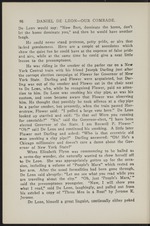 |
“...couple of anecdotes which
show the quiet fun he could have at the expense of false pride
and airs, while at the same time he could give a neat little
lesson to the presumptuous.
He was riding in the smoker of the parlor car on a New
York Central train with his friend Joseph Darling just after
the corrupt election campaign of Flower for Governor of New
York State. Darling and Flower were acquainted, but Dar-
ling was out of the smoker and Flower sat in the chair next
to De Leon, who, while he recognized Flower, paid no atten-
.tion to him. De Leon was smoking his clay pipe, as was his
custom, and soon became aware that Flower was observing
him. He thought that possibly he took offence at a clay pipe
tn a parlor smoker, but presently, when the train passed Hav-
erstraw, Flower said: I polled a large vote here. De Leon
looked up startled and said: Is that sol Were you running
for constable? No, said the Governor-elect, I have been
elected Governor of the State, I am Roswell P. Flower.
Oh! said...”
|
|
| 2 |
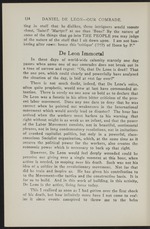 |
“...imitations
of crooked capitalist politics, but only in a powerful, class-
conscious Socialist organization, which, at the same time as it
secures the political power for the workers, also creates the
economic power which is necessary to back up that right.
However, De Leon would feel deeply wounded could he
perceive our giving over a single moment at this hour, when
action is needed, to moping over his death. Such was not his
idea of a soldier in the revolutionary movement. Not for that
did he train and inspire us. He has given his contribution to
to the Movementthe tactics and the constructive basis. It is
for us to build. And in this work of building, in this activity,
De Leon is the active, living force today.
This I realized as soon as I had gotten over the first shock
of his death, but how infinitely more have I not come to real-
ize it since events conspired to throw me to the helm...”
|
|
| 3 |
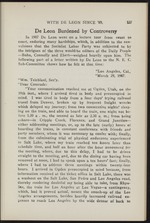 |
“...reached me at Ogden, Utah, on the
19th inst., where I arrived tired in body and preoccupied in
mind. I was tired in body from a four days trying railroad
travel from Denver, broken up by frequent freight wrecks
which delayed my journey; from two consecutive nights sleep-
ing on the train, and able to board the train, one night not be-
fore 1.30 a m., the second as late as 2.30 a. m.; from being
ashorein Cripple Creek, Florence, and Grand Junction
either addressing meetings, or, up to the late (early) hours of
boarding the trains, in constant conference with friends and
party members, whom it was necessary to confer with; finally,
from the culminating trial of physical endurance experienced
in Salt Lake, where my train reached ten hours later than
schedule time, and half an hour after the hour announced for
the meeting, where, due to this delay, I had to be driven
straight to the meeting, and, due to the dining car having been
removed at noon, I had to speak upon a ten hours fast; finally,
where...”
|
|
| 4 |
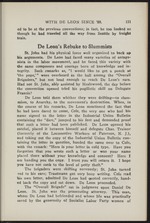 |
“...WITH DE LEON SINCE 89. 151
ed to be at the previous conventions; in fact, he too looked as
though he had traveled all the way from Seattle by freight
train.
De Leons Rebuke to Slummists
Sl John had his physical force well organized to back up
his arg^uments. De Leon had faced many varieties of antago-
nists in the labor movement, and he faced this variety with
the same composure and courage born of knowledge and in-
tegrity. Such remarks as, I would like, to get a punch at
the pope, were overheard in the hall among the Overall
Brigaders, but not loud enough to reach De Leons ears.
Had not St. John, ably assisted by Heslewood, the day before
the convention opened tried his pugilistic skill on Delegate
Francis?
De Leon told them whither they were driftingto slum-
mism, to Anarchy, to the movements destruction. When, in
the course of his remarks, De Leon mentioned the fact that
he had been dared to come, Cole, the very one who had his
name signed to the letter in the Industrial Union Bulletin...”
|
|
| 5 |
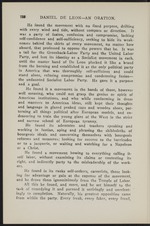 |
“...ient and could
stand alone, refusing compromise and condemning fusion
the undaunted Socialist Labor Party. He gave it a purpose
and a goal.
He found it a movement in the hands of those, however
well meaning, who could not grasp the genius or spirit of
American institutions, and who while conforming in dress
and manners to American ideas, still kept their thoughts
and language in glazed peaked caps and wooden shoes, pat-
terning all things political after European models, and en-
deavoring to train the young giant of the West in the strict
and narrow school of European tyranny.
He found its advocates and teachers speaking and
working in fustian, aping and phrasing the shibboleths of
bourgeois ideals and concerning themselves with bourgeois
reforms and measures; looking for success to the barricades
or to a jacquerie, or waiting and watching for a Napoleon
or a Christ.
He found a movement bowing to everything calling it-
self labor, without examining its claims or contesting its
right, and...”
|
|
